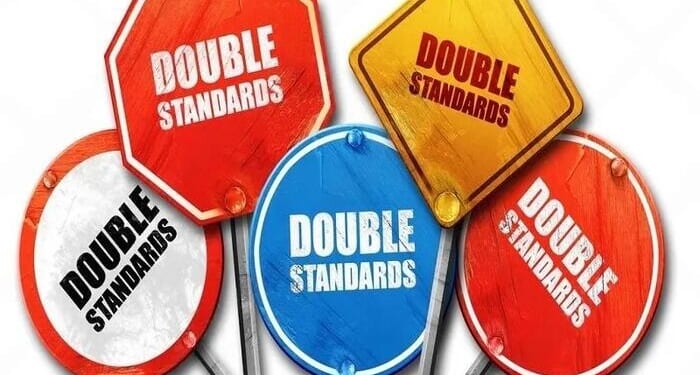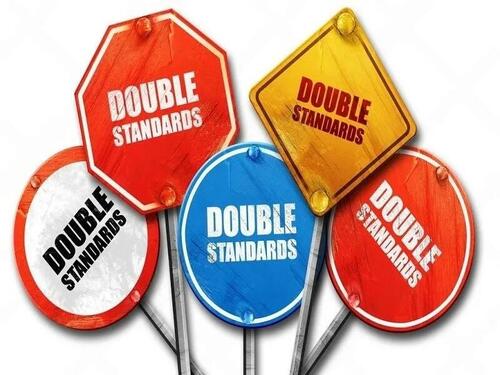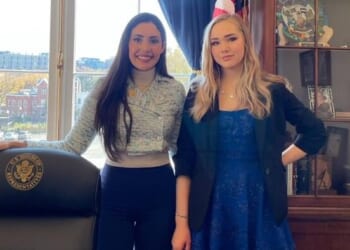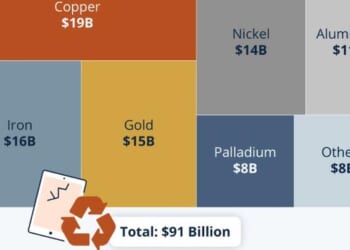Authored by Andrew Korybko via Substack,
Russian Foreign Minister Sergey Lavrov gave an informative interview to Kommersant in mid-October.
Russian international media mostly focused on his remarks about ties with the US, concerns about its potential transfer of Tomahawk cruise missiles to Ukraine, and the special operation, but he also importantly exposed the US’ double standards towards resolving the Levantine and Ukrainian Conflicts.
Here’s exactly what he said, which will then be analyzed in terms of its practical relevance:
“[The Trump Declaration for Enduring Peace and Prosperity] emphasizes that the protection of human rights, ensuring security, respect for the dignity of both Israelis and Palestinians, as well as tolerance and equal opportunities for all regions, are the keys to the sustainability of the agreement (this declaration). The declaration calls for the eradication of extremism and radicalism in all forms. Golden words. But for some reason, this applies to Palestinians and Israelis, but not to Russians in Ukraine.
More recently, regarding another part of the Middle East, Syria, US Special Representative for Syria (and also US Ambassador to Turkey) Thomas Barrack said that the Syrian Arab Republic needs a system close to a federation that would preserve the culture and language of all ethnic and religious groups in society. This is precisely what the Minsk agreements were about. For some reason, the West is ready to apply these principles everywhere, but in Ukraine, it is ‘not ready.’”
Beginning with the first part, Russia demands Ukraine’s denazification, which requires “the eradication of extremism and radicalism” in all forms there through hybrid kinetic-legal means. The kinetic ones are being advanced through attacks against fascist-inspired Ukrainian militiamen like the Azov Brigade while the legal ones are envisaged as part of the lasting political solution that Putin wants. A similarly symbolic multilateral call as Trump’s declaration could be the first step to that end amidst ongoing negotiations.
As for the second part, Russia won’t cede to Ukraine the disputed regions under its control after their people voted to join Russia in September 2022, but it could demand sub-federative cultural-linguistic rights for the Russians who remain in the Ukrainian-controlled parts if the frontline freezes.
To be clear, Russia officially insists that it’ll liberate the entirety of the disputed regions, but the aforesaid Minsk- and Syrian-inspired proposal could facilitate a grand compromise if all sides have the political will.
The relevance of exposing the US’ double standards towards resolving the Levantine and Ukrainian Conflicts therefore isn’t just to score soft power points, but to hint at creative ways in which the aforesaid US-endorsed Levantine solutions could be applied to Ukraine in the interests of consistency.
This assumes that the US is interested in policy consistency, but whether right or wrong, it doesn’t detract from Lavrov’s motives in bringing up the policy precedents that the US itself just established.
Realistically speaking, Trump doesn’t seem interested over half a year since the start of his talks with Putin in suddenly acceding to Russia’s proposals on Ukraine since he would have already pressured Zelensky if he was, not escalated his rhetoric and contemplated a military escalation too.
Nevertheless, Russia’s continued on-the-ground gains and the predictable failure of Ukraine’s next potential US-backed offensive might get him to reconsider, in which case Lavrov’s implied proposals would become relevant.
Views expressed in this article are opinions of the author and do not necessarily reflect the views of ZeroHedge.
Loading recommendations…


















